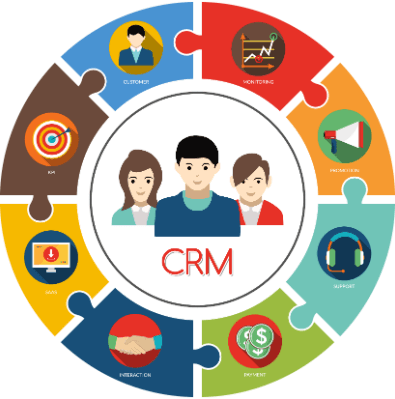
During the initial days, most of the founders or business owners have only one thing to worry about: to start selling and obtain benefits out of it. When there is less number of customers, it is relatively easy to keep control of your sales process. But as the business starts scaling up, managing a growing mass of leads in different stages of the buying process becomes increasingly complex. In order to sell more effectively at this stage, you will have to optimize your sales process. This is when CRM comes to your rescue.
What is a sales CRM?
CRM stands for Customer Relationship Management. CRM software allows multiple members of a team to manage a relationship with customers, sales processes and marketing of the company effectively. It allows all data to be centralized in one place, optimizes the processes, eases detection of errors, saves a lot of time using automation, and ultimately more sales are achieved.
Let us see how CRM software can shorten your sales cycle and improve your sales process.
#1 Documentation of the sales process:
The sales process originates in the mind of the founder or VP and then goes on a piece of paper. But as the business scales up, it is not easy to handle the information effectively through word of mouth or on scattered documents. With the help of a CRM software, you can document all stages of the sales funnel, from initial contact till the closure of the sale. This will keep all your team members informed as well as help the future hires. Even new hires can handle a customer at any given stage effectively by looking at the documented information.
#2 Creation of repeatable processes:
If each sales rep is free to approach their prospects as they like, your company will have as many sales processes as its salespeople. A CRM software can help standardize the interactions between vendors and customers. This gives a consistency to customer relations but will also save your time. This, in turn, shortens the sales cycle and increases the efficiency of the sales process.
#3 Automation reduces data entry:
Most of the companies use spreadsheets to track leads as well as opportunities before they use CRM software. While Excel sheets can help some users save time, the data entry process on the spreadsheet can be frustrating. This time can be utilized for connecting with new prospects. CRM systems streamline and reduce the data entry job for the reps by syncing and auto-population features. More active selling time means happier reps and increasing customers and revenue. You can also automate data entry by integrating your CRM with other apps.

#4 Prediction is more accurate:
According to a study, 88% of the spreadsheets contain errors. Using these as a basis for your decisions will make your calculations and forecast fail. By implementing the best CRM software, organizations can increase the accuracy of their forecasting.
#5 Accuracy in tracking quota:
Management should take responsibility of tracking and monitoring quota achievement by the reps- both positive and negative performances. Automating the sales process through a CRM, the manager can monitor quota attainment more effectively, and spot trends in time to respond appropriately.
#6 Centralization of information:
Having different sources of information can drive you crazy while you look for answering a particular question. Instead, implementing a CRM that everyone acknowledges is the source which can help during such situations. CRM centralizes all the information at one place- product and customer information. This eases the entire process, saving time and relationship with your customers.
#7 Tracking rep progress:
Before implementing a CRM, managers have to ask the reps if they are on track to meet the quota. It is highly time-consuming and not a very effective process. Implementing a CRM allows the managers to check the progress of their reps without constantly bugging the reps or without disturbing the process.
#8 Creation of a sustainable sales force:
There is one manager who manages the spreadsheet and knows how exactly it works. But his leaving makes everyone feel as if months and years of documentation and knowledge has vanished from the organization. CRM is essentially a shared knowledge system as it documents the entire sales process, saving the sales infrastructure from getting hampered by anyone’s departure.
#9 Increased visibility of customer information:
CRM is primarily intended for the sales department, but all other departments in the company might require customer information at some point in time. CRM acts as a centralized system for storing this data. Marketing and Support teams having access to this data helps them approach clients better informed and more prepared. This visibility is enough to drive a better and more enduring and profitable relationship.
#10 Identification of ideal buyers:
CRM helps you analyze the win rates for both large and small deals. It also helps your reps understand your success rate with companies of varying sizes. This enables them to understand the patterns of a buyer vs. a non-buyer, thus helping faster deal closure.
These may be enough to convince you that a CRM helps you shorten your sales cycle. Choose the one that suits your business.

